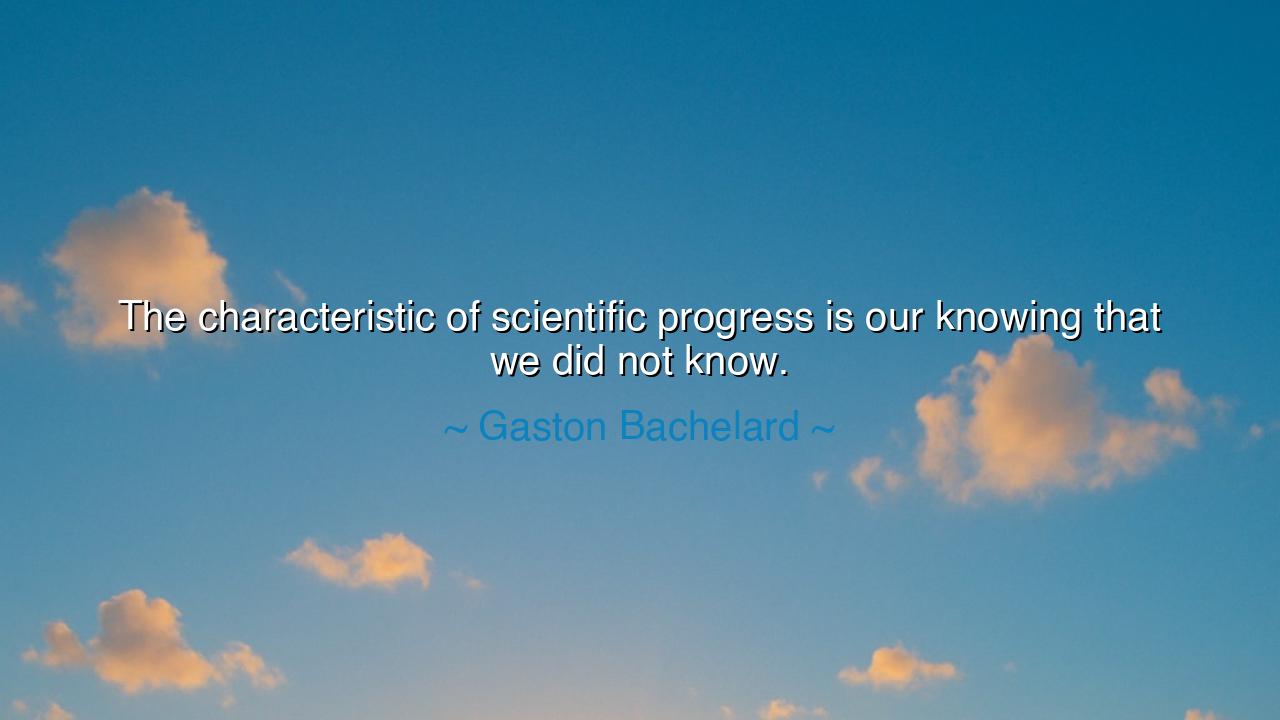
The characteristic of scientific progress is our knowing that we






Gaston Bachelard, philosopher of knowledge and dreamer of the rational spirit, once said: “The characteristic of scientific progress is our knowing that we did not know.” These words strike like a bell in the silence of ignorance, reminding us that true wisdom begins not in pride, but in humility. For the great engine of discovery does not roar from certainty, but from the recognition of limits. To confess, “I do not know,” is not weakness—it is the first, the most sacred step on the road toward truth.
The ancients whispered this long ago. Socrates, standing in the marketplace of Athens, declared himself the wisest of men only because he knew that he knew nothing. His humility was not despair, but strength, for in acknowledging his ignorance he opened himself to endless growth. Bachelard’s words flow from the same river: the essence of progress is not clinging to old knowledge as if it were complete, but daring to admit its insufficiency. Only then can the human mind stretch beyond its walls and seek new horizons.
History is filled with examples of this sacred recognition. Consider the voyage of Nicolaus Copernicus, who studied the heavens in the sixteenth century. For centuries, men believed the Earth to be the center of all things. Yet Copernicus, gazing upward, saw that this knowledge was flawed. By admitting what was not known—by confessing the ignorance hidden in inherited truth—he shifted the axis of human understanding. Out of the courage to say “we were wrong” arose the heliocentric vision, a revolution that lit the path for Galileo, Kepler, and Newton.
So too in the modern age. The world once believed that time and space were absolute, immutable, and fixed. Then came Albert Einstein, who dared to admit that our vision of reality was incomplete. By recognizing what humanity did not know, he opened the gates of relativity, revealing that time bends, that space curves, that energy and matter are one. It was not arrogance but humility before the unknown that allowed such a leap. And thus, Bachelard’s wisdom was proven once more: the progress of science is carved from the courage to face ignorance.
Yet let us not think this lesson belongs only to the great. Every man, every woman, every child who has ever learned has walked this same path. The student who admits confusion, the craftsman who confesses error, the thinker who dares to say “I was wrong”—these are not failures, but seeds of growth. To pretend to know when we do not is to harden the heart against learning. To admit not knowing is to fling open the doors of possibility.
But there is danger too. Pride whispers that to admit ignorance is shame, that to confess weakness is defeat. Many cling to false certainties, refusing to release the comfort of “knowing.” In this refusal lies stagnation, blindness, and ruin. Nations, like men, that cling to illusions of complete knowledge fall into arrogance and collapse. Thus, Bachelard calls us to embrace humility as the true sign of progress—a humility that is not weakness but the soil from which wisdom grows.
So I say to you, seekers of light: let your hearts be unafraid to say, “I do not know.” Wear these words not as a badge of failure, but as a crown of courage. For only the mind that acknowledges its darkness can seek the flame of truth. Let your progress be measured not by what you cling to, but by what you are willing to release. In this way, you walk the path of the philosopher, the scientist, the sage. And remember always: the characteristic of scientific progress—and of all wisdom—is not in pretending to know, but in knowing that we did not know, and daring to seek what lies beyond.






AAdministratorAdministrator
Welcome, honored guests. Please leave a comment, we will respond soon